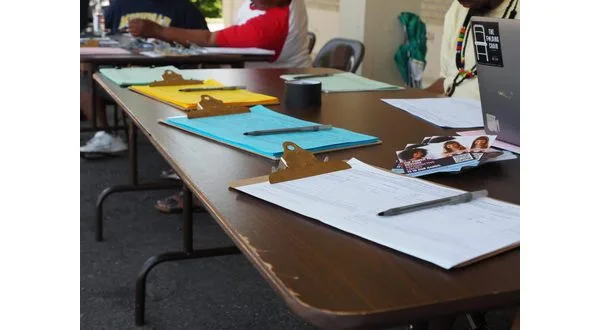
Two ballot question committees on Thursday asked the court to block six Arkansas laws regulating direct democracy, one day after a federal judge granted them permission to intervene in an existing lawsuit.
The original suit, brought by the League of Women Voters of Arkansas, challenges the constitutionality of state laws governing the petition and referendum process. The League also is gathering signatures to qualify its proposed ballot measure for the 2026 ballot.
The League and Protect AR Rights, one of two ballot question committees intervening in the suit, are both pursuing ballot measures aimed at protecting Arkansans’ right to direct democracy.
Direct democracy is the process by which Arkansans can propose new laws or constitutional amendments and place them on the ballot for a statewide vote. Arkansas is one of 24 states that allow citizen-led initiatives, according to the National Conference of State Legislatures.
Protect AR Rights and For AR Kids, a ballot question committee pursuing an education-related ballot measure, filed a complaint, motion for preliminary injunction and brief in support of the motion Thursday. The coalitions requested a hearing on the motion, a preliminary injunction to block the laws and an order requiring the secretary of state to count and verify any otherwise legally valid signatures that don’t comply with the challenged laws.
The laws the groups are asking a judge to block are:
Ark. Code Ann. § 7-9- 601(a)(2)(C), which requires a ballot initiative sponsor to provide the secretary of state the name and address of paid canvassers before they solicit any signatures; and the associated Ark. Code Ann. § 7-9-126(b)(4), which provides that, if the sponsor fails to provide this information, the signatures the paid canvasser collected won’t count.
Protect AR Rights and For AR Kids argue in their 56-page complaint that the state laws infringe on their First and Fourteenth Amendment rights.
Some of the laws challenged by the coalitions are the same ones challenged in the League’s original suit, including the one that criminalizes a canvasser’s failure to have potential signers read the ballot title.
For AR Kids failed to collect sufficient signatures to qualify for the 2024 ballot, but is working to make it on the 2026 ballot. The attorney general approved For AR Kids’ ballot title in February, which allows the group to begin collecting signatures.
The coalition argued in Thursday’s court documents that the new state laws reduce the amount of signatures canvassers can collect in a given period because it takes longer to comply with all the regulations. Additionally, the laws have made it more difficult to recruit people to collect signatures.
“Since the Attorney General approved its 2026 ballot measure, For AR Kids has contacted over eighty previous volunteers from more than thirty counties to gauge their interest in collecting signatures for the 2026 initiative campaign,” the complaint states. “Many canvassers indicated that they did not intend to participate this cycle and cited the new laws as a reason.”
For AR Kids and Protect AR Rights are also challenging laws not included in the League’s suit, including one prohibiting ballot titles from being written above an eighth-grade reading level. The ranking is determined by the Flesch-Kincaid Grade Level formula, a test that uses word complexity and sentence lengths to calculate what grade of education is needed to comprehend written material.
Protect AR Rights’ ballot measure has been rejected twice for failing to meet this requirement. The coalition argued in court filings it can’t comply with the law while also satisfying “preexisting content requirements for ballot titles.”
Attempting to comply with the reading-level law forces the coalition “to select language to game a mechanical test” instead of selecting language to convey its preferred message with voters, the complaint states. Protect AR Rights also asserts that the reading-level requirement can’t be met “without omitting essential facts” needed for certification and to inform voters about “the political change that the measure proposes.”
“By making it far more difficult, if not impossible, to gain the Attorney General’s approval for an initiated measure, the Reading-Level Requirement impedes Protect AR Rights’ ability to engage voters about political change and to present its measure to the voters at an election,” the complaint states.
For AR Kids’ measure was approved in February before the new law took effect in April. The League’s measure satisfied the reading-level requirement when it was certified in May.
Protect AR Rights submitted the third version of its proposal to the attorney general’s office earlier this month, and the deadline for him to reject or certify the submission is July 29.
WebReadyTM Powered by WireReady® NSI










